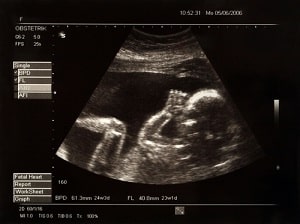How do babies respond to music in the womb?
© 2022 Gwen Dewar, Ph.D., all rights reserved

Music in the womb? It's become an almost cartoonish platitude of mod pregnancy — a pregnant mother-to-be playing tunes for her unborn baby.
But is this actually a thing? Do fetuses actually respond to music? Will they remember any of it later? The short respond is yes.
In the last trimester of pregnancy, babies go increasingly capable of hearing a range of musical tones, and studies confirm that babies react — in the womb — to the sounds they hear. Moreover, if a late-term fetus "overhears" the same melody again and again, information technology volition likely recognize this melody afterwards — when it hears the music as a newborn.
Practice such prenatal experiences make children smarter? Should parents make a special attempt to expose their babies to music through loftier-tech gadgets?
In that location's no evidence for that, and in fact experts urge parents to avoid sure kinds of music exposure.
For example, they suggest confronting placing earphones or other audio devices directly onto a pregnant woman's belly. They besides warn mothershoped-for to avoid exposing their bodies to loud, deep, booming noises, or to decibel levels that pose a risk to their own hearing.
But the research helps us capeesh that our babies are engaging with the world long before birth. And it should encourage parents to share musical experiences with their babies — both earlier and later pregnancy.
Here are the details.
At what point during pregnancy can a baby hear music in the womb?
A baby's sense of hearing doesn't get "online" all at one time. It happens in steps, and every baby develops at his or her own stride. And of course sounds get muffled in the womb — specially sounds at college frequencies.
So it isn't a straightforward question to answer — the age at which your baby will be able to hear your favorite tune.
Nosotros know that babies tin hear some sounds during the 2d trimester of pregnancy, and by 25 weeks gestation, approximately half of all fetuses are responsive to tones in the range of 100-500 Hz — a range that overlaps with developed speech (Hepper and Shahidullah 1994). So babies might be capable of hearing music — or at to the lowest degree some bitty elements of music — that also autumn into this range.
But for better listening abilities, we have to expect until babies are bit older — around xxx weeks or more than.
For instance, most babies don't answer to tones every bit high as 1000 Hz (which is only a smidge lower than "loftier C" on a keyboard) until at least thirty weeks gestation (Hepper and Shahidullah 1994).
And when researchers presented fetuses with an entire lullaby — as opposed to a few, isolated tones — they found evidence that babies begin paying more than attending to music at around 33 weeks gestation (Kisilevsky et al 2004).
Tin can music be too loud for a infant in the womb?
Information technology'southward possible, and then we need to exist mindful of the potential for impairment. For decades, medical experts have recommended the same, cautious approach to prenatal sound exposure (Graven 2000; Kruger et al 2021):
- Don't attach earphones or any other sound production devices to a pregnant abdomen.
- Avoid environments where noise levels put your own hearing at risk.
- If you're listening to lower-frequency sounds, avoid sustained volumes over 65 decibels. A female parent'southward body muffles the intensity of sound that the babe hears, but not as effectively when sounds are lower or deeper. Music with a loud, pulsing bass line could be hazardous.
How do fetuses answer to music?

That'southward a skilful question. On a superficial level, we know that babies notice when audio — voices or music — filters into the womb. Their heart rates modify, and they tend to move effectually more (due east.thousand., Kisilevsky et al 2010; Gerhard and Abrams 2000; Arabin and Riedewald 1992).
But are babies noticing the contours of music? Are they sensitive to patterns? The specific sequence of notes that they hear?
In that location's reason to retrieve then, considering studies suggest that newborns may recall music they heard during pregnancy.
Evidence that babies tin can recognize music they heard during gestation

If a pregnant woman listens to the same melody — again and over again — it presents a possibility. Might her fetus get familiar with the music? And so much so that the babe volition be capable recognizing the tune after — after childbirth?
Decades ago, Peter Hepper tested the idea past observing the responses of newborns to a particular television testify theme song.
Some of the babies had gestated with mothers who were fans of the TV program. As fetuses, these babies had heard the theme song many times.
And other babies? Their moms hadn't watched the testify during pregnancy. The theme song was totally unfamiliar to them.
Then Hepper played the melody to newborns, and institute show for fetal memory.
The babies who had "overhead" the theme vocal during gestation became more warning. Their heart rates slowed, and they stopped moving around.
This reaction was absent when the same infants listened to other, unfamiliar melodies. And it was too absent among the babies who hadn't been exposed to the Television set theme during pregnancy (Hepper 1998).
Intrigued, Hepper conducted a follow-up study, where he monitored fetuses directly via ultrasound.
Over again, he tested babies' responses to the same TV theme song, and over again, he found a difference. It wasn't apparent among young fetuses (babies at 30 weeks gestation). Simply by 37 weeks gestation, infants were behaving differently when they heard familiar (every bit opposed to unfamiliar) music (Hepper 1991).
Is this conclusive? Non exactly. The studies were minor, making it hard to dominion out adventure furnishings. Only Hepper'due south work inspired other research — and the results support the idea that fetuses can learn well-nigh music.
For example, in a controlled experiment, researchers created and recorded a unique piano melody, and and so assigned pregnant women to play it back to their fetuses, starting at 35 weeks gestation.
The fetuses heard the music twice daily for three weeks only. Then it stopped, with no further music sessions until four weeks after the babies were built-in.
And that's when the babies — 25 infants in total — faced the big test: They were brought to a laboratory, where they heard the melody once again. In improver, they listened to a make-new piece, another piano melody they had never encountered earlier.
What happened? The researchers monitored the babies' center rates, and compared these with the heart rates of 25 infants in a control group. And the dissimilarity was pretty dramatic.
Babies in both groups tended to experience a momentary tedious-down in heart rate as they listened to music. But the effect was much larger for infants who listened to music they had heard previously, during gestation (Granier-Deferre et al 2011).
It was every bit if they recognized the old, "prenatal" music, and establish it to be especially calming.
What near responses in the brain?
When babies listen to music, it doesn't but impact their heart rates. It as well stimulates encephalon activity, and researchers can rail changes in this activity by using effect-related potentials (ERPs) – small changes in voltage that tin exist detected by attaching electrodes to an baby's scalp.
And then Eino Partanen and his colleagues used this approach to expect for neural differences in the way that newborns respond to music. Do their brains react differently if they hear music they encountered during gestation?
Partanen's team began their written report by asking a dozen meaning women to follow a specific music-listening regimen, starting at 29 weeks gestation.
Once per day, 5 times per week, the mothers-to-be listened to a peculiarly-prepared, keyboard rendition of the song, "Twinkle, Twinkle, Piffling Star."
The babies ended up hearing this tune a lot. Anywhere between 138 and 192 times!
Just the prenatal music "lessons" ended immediately before childbirth. And and then, every bit newborns, the babies heard the melody in one case again — the showtime time since emerging from the womb.
The researchers recorded the infants' ERPs as they listened. And they did the same for infants in a command group — newborns who hadn't been through the special, prenatal regimen.
And the outcome?
There was a clear deviation between groups. The babies who had experienced prenatal "preparation" showed a stronger, more dramatic change in brain activeness while listening to the familiar tune.
Moreover, it was a difference that lasted. The researchers tested the infants again at four months postpartum, and found that babies with prenatal experience of "Twinkle, Twinkle" continued to prove a stronger neural response to it (Partanen et al 2013).
So does listening to music in the womb make babies smarter?
There'southward no evidence for that, or for related claims that we can boost intelligence by listening to music after birth. (Read more than almost it in my article about the so-called Mozart Consequence.)
In fact, as I write this, at that place is no consensus among researchers that prenatal music delivers long-term benefits to babies.
For example, when researchers have examined trends across studies, they haven't plant that prenatal "music therapy" delivers clinically meaningful health benefits to infants (He et al 2021).
Listening to music tin reduce stress for the mother, and that'south a proficient thing. But it's not yet articulate if babies feel whatsoever special health effects as the effect of existence exposed to music in the womb.
Nevertheless, nosotros've got reason to think that unborn babies are stimulated by music, and can become familiar with certain tunes. That should encourage us to share music with our unborn infants. To sing. To brand music with friends. To mind to music the "old-fashioned" manner — by filling the the air with it. Not by piping music into earphones.
And this research should inspire us to regard newborns with additional respect. They aren't mere "survival machines," with nothing in their heads but instinctive programming to consume or cry.
On the contrary, they have been paying attending to the social globe — the social world of sound — for many weeks earlier birth. And by the time they meet usa face to face, they are ready — and eager — to acquire more.
More than reading
Desire to know what else babies are learning before birth? Bank check out my Parenting Scientific discipline article, "Prenatal learning: Practise pregnancy foods affect babies' eating habits?"
And for more data about the remarkable abilities of newborns, see these Parenting Science articles:
"The social world of newborns: Why babies are built-in to learn from our sensitive, loving care"
"Newborn cognitive development: What are babies thinking and learning?
"The newborn senses: What can babies feel, meet, hear, smell, and gustation?"
References: Music in the womb
Arabin B and Riedewald S. 1992. An attempt to quantify characteristics of behavioral states Am J Perinatol 9: 115-119
Gerhardt KJ, Abrams RM. 2000. Fetal exposures to sound and vibroacoustic stimulation. J Perinatol. 20(8 Pt 2):S21-30.
Granier-Deferre C, Bassereau S, Ribeiro A, Jacquet AY, Decasper AJ. 2011. A melodic contour repeatedly experienced by human near-term fetuses elicits a profound cardiac reaction one month after nascency. PLoS One. half-dozen(ii):e17304.
Graven SN. 2000. Sound and the developing infant in the NICU: conclusions and recommendations for care. J Perinatol. twenty(viii Pt 2):S88-93.
He H, Huang J, Zhao 10, Li Z. 2021. The effect of prenatal music therapy on fetal and neonatal status: A systematic review and meta-analysis. Complement Ther Med. lx:102756.
Hepper PG. 1988. Fetal "soap" habit. Lancet 1(8598):1347-viii.
Hepper 1991. An Examination of Fetal Learning Before and After Nativity. Irish Journal of Psychology 12: 95-107.
Hepper PG and Shahidullah BS. 1994. Evolution of fetal hearing. Archives of disease in childhood-fetal and neonatal edition 71: F81-F87
James DK, Spencer CJ, Stepsis BW. 2002. Fetal learning: A prospective randomized controlled study. Ultrasound Obstet. Gynecol. 20:431–438.
Kisilevsky BS and Hains SMJ. 2010. Exploring the relationship between fetal heart rate and cognition. Infant Kid. Dev. 19:lx–75.
Kisilevsky South, Hains SM, Jacquet AY, Granier-Deferre C, Lecanuet JP. 2004. Maturation of fetal responses to music. Dev Sci. vii(five):550-ix.
Krueger C, Horesh Due east, Crossland BA. 2012. opens in a new windowCondom sound exposure in the fetus and preterm infant. J Obstet Gynecol Neonatal Nurs. 41(2):166-170.
Partanen Due east, Kujala T, Tervaniemi M, Huotilainen Chiliad. 2013. Prenatal music exposure induces long-term neural effects. PLoS One. eight(x):e78946.
Content of "How exercise babies answer to music in the womb" last modified eight/21
Title image of pregnant adult female at piano past hanamirae / istock
image of ultrasound by Mikail Damkier / shuttestock
image of newborn gazing at mother by chomplearn / shutterstock
Source: https://parentingscience.com/how-do-babies-respond-to-music-in-the-womb/
Belum ada Komentar untuk "How do babies respond to music in the womb?"
Posting Komentar